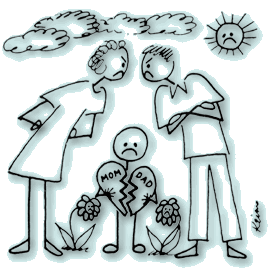
Dating and the Mediator - Part 3
Sometimes I hate being a mediator. Sometimes I don’t want to make that commitment to being a good listener and communicator. A recent incident that demonstrates this desire is a 5 day discussion I had with my boyfriend over the number of glasses that we were going to have in our kitchen cupboard. He had 24 and then became insistent on 18. I had paired them down to 14 – I figured that was 2 a day for a week – it made sense to me. Oh no, that was crazy talk. How could one person be expected to use only TWO glasses a day? My answer was if someone used more than 14 glasses a week than they just needed to learn to do dishes more (I am currently only there on the weekend, all of this is in preparation for my gradual move in).
I noticed both of digging into our positions, so I asked a good open-ended question to try to expose his interests, “Help me understand why it is important for you to have so many glasses.” Well, he gave me stupid answers like, “I drink more than one type of beverage a day and you can’t mix milk and juice.” To which I responded, “So just rinse out the glass and its like you never put the milk in there.” To which he responded, “Ew! You can’t do that, the glass is contaminated!” So again, I asked, help me understand how that is different than what happens in the dishwasher. Soap, my friends, soap, also the glass may not be contaminated but the beverage is definitely watered down by the droplets of water left on the glass and furthermore, it is just too much work to dry the glass. When asked if his drink has ever tasted watered down he responded, “That is not the point, I know the water is in there.” Of course my reasoning was just, “Look, 18 glasses is excessive.”
He finally got me with the symmetry interest – that 18 glasses would be three rows of six, half a cabinet and symmetrical. Finally! An interest we both share! Its organized and pleasing to the eye, a bridge was being built. I wanted to put in one last bid to see if I could win and offered 15 glasses as a way to meet his symmetry argument – that would be 3 rows of 5. No. It had to be 18. I was just about ready to give in and let him have the 18 until he said, “I am putting my foot down about the 18 glasses.” Oh really? Foot down? I thought to myself well, he has drawn his line in the sand, I can continue to collaborate and try to come to a win-win or I can draw my line. I drew my line. I actually was about to give in until the foot came down. At this point the conflict was no longer about what the right amount glasses was appropriate for our storage capacity, but about who was right and who was wrong. This was no longer a problem solving session – it was a competition.
So our conflict was escalated by us each focusing on positions rather than interests and also by both parties not wanting to move much. Also, our positions were fueled a lot by our different world views. We see this in mediation all the time. Sometimes someone has to give up a lot or completely in order to see a conflict resolved. I had to either outwait the king of stubbornness or let him have what he wanted. This is where I had to look outside the walls of my conflict to evaluate what was really important to me. Was it important to me to win and be “right”? What did I really gain? What did I lose? I had to look at these aspects and decide what I really valued was not having hour long discussions on a daily basis about 18 stupid glasses, or really it was 3 glasses since I was willing to allow 15. I needed to look at the big picture. A lot of times this is what clients in mediation need. They get tunnel vision and can only see one aspect of their problem. There is usually a whole other world outside of that one little bit. I realized this with the glasses and I gave in. He has his three rows of six. They are after all, just glasses.
Mandy Stallings


